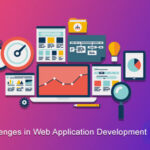How Mobile App Development Is Changing in 2023: Key Trends to Watch
In the fast-paced world of technology, mobile app development is constantly evolving to meet the growing demands of users. With the arrival of 2023, we can expect to see significant changes in this field, driven by emerging trends that promise to reshape the way we interact with mobile applications. In this article, we will explore the key trends to watch in mobile app development in 2023.

Progressive Web Apps (PWAs) Taking Center Stage
Progressive Web Apps (PWAs) are gaining momentum and are set to take center stage in 2023. PWAs combine the best features of websites and mobile apps, providing users with a seamless experience across different devices. These apps are easily discoverable through search engines and can be installed directly from a web browser, eliminating the need for traditional app stores. With their offline capabilities and improved performance, PWAs offer a compelling alternative to native mobile apps.
Augmented Reality (AR) Integration
Augmented Reality (AR) has been making waves in recent years, and in 2023, we can expect to see its integration into mobile app development. AR technology enhances the real world with digital elements, opening up new possibilities for engaging user experiences. From gaming and retail to education and healthcare, mobile apps with AR capabilities will revolutionize various industries. Developers will focus on creating immersive AR experiences that provide users with interactive and personalized content.
Internet of Things (IoT) Integration
The Internet of Things (IoT) continues to expand its reach, connecting various devices and enabling them to communicate and share data. In 2023, mobile app development will witness increased integration with IoT, allowing users to control and monitor smart devices seamlessly. Whether it’s managing home automation systems or accessing data from wearable devices, mobile apps will serve as the gateway to IoT ecosystems, providing convenience and efficiency to users.
Artificial Intelligence (AI) and Machine Learning (ML)
Artificial Intelligence (AI) and Machine Learning (ML) are becoming indispensable in mobile app development. These technologies empower apps to learn from user behavior, personalize experiences, and make intelligent predictions. In 2023, AI and ML will play a crucial role in enhancing app security, optimizing performance, and delivering personalized recommendations. From voice assistants to chatbots, AI-driven features will become more prevalent, enabling apps to offer smarter and more intuitive interactions.
Enhanced App Security and Privacy Measures
With the growing concern over data breaches and privacy infringements, mobile app developers are prioritizing security and privacy measures. In 2023, we can expect to see enhanced security features, such as biometric authentication and data encryption, becoming standard in mobile app development. Stricter regulations and user expectations will drive developers to adopt robust security practices, ensuring that user data remains protected.
5G Revolutionizing App Development Experiences
The advent of 5G technology is set to revolutionize the mobile App Development landscape. With its lightning-fast speeds and low latency, 5G will enable richer app experiences, paving the way for immersive technologies like virtual reality (VR) and augmented reality (AR). In 2023, developers will leverage the power of 5G to deliver high-quality streaming, real-time multiplayer gaming, and seamless cloud integration. This shift will unlock new possibilities and empower mobile apps to reach new levels of performance and interactivity.
Voice-Enabled Applications
The rise of voice assistants like Siri, Alexa, and Google Assistant has paved the way for voice-enabled applications. In 2023, we will witness an increased focus on voice integration in mobile apps. Users will be able to interact with apps using natural language, making tasks more convenient and hands-free. From voice search to voice commands, mobile apps will leverage voice recognition technology to provide a more intuitive and accessible user experience.
Cross-Platform Development
As the number of devices and operating systems continues to expand, cross-platform development will gain prominence in 2023. Developers will utilize frameworks like React Native and Flutter to build apps that can run seamlessly across multiple platforms, saving time and resources. This approach will enable businesses to reach a wider audience and reduce the development cycle, ultimately driving innovation and growth in the mobile App Development industry.
App Gamification
Gamification, the integration of game mechanics into non-gaming contexts, is gaining traction in mobile app development. In 2023, we can expect to see more apps incorporating gamified elements to enhance user engagement and retention. By rewarding users with points, badges, or virtual currencies, apps can create a sense of accomplishment and encourage continued app usage. Gamification will be utilized in various domains, including fitness, education, and productivity, to motivate users and make the app developer experience more enjoyable.
Enhanced User Personalization
Personalization has become a key aspect of user experience, and in 2023, mobile app developers will focus on delivering highly personalized experiences to users. Through data-driven insights and AI technologies, apps will adapt to users’ preferences, behavior, and context to provide tailored content and recommendations. From personalized product recommendations to customized interfaces, mobile apps will strive to create a more relevant and engaging user experience.
What is the Matter of the Latest Mobile App Development Technologies?
The mobile App Development sector produces a wide range of products, including consumer-grade messaging apps, high-performing medical explanations, and corporate solutions. To complete an app that is stable and functional, designers must consistently use the most up-to-date technology accumulation. Only the numerous widely used frameworks and libraries, which function as the basis for creating high-quality applications for numerous platforms like Android, iOS, Windows, etc., can accomplish this.
Mobile app technologies are known in the mobile app needs and can be used to produce applications that work with Internet of Items (IoT) appliances, offer sociable media integration, offer cloud storage services, or communicate with other devices.
Mobile apps’ integration with other platforms and devices
In 2023, there will be more potential for mobile App Development integration due to the growing popularity of connected platforms and devices such as smart home appliances, wearable technology, and voice assistants. Through the usage of mobile devices, users will be able to control and manage their linked platforms and devices, resulting in more convenient and seamless user experiences. By 2028, the size of the worldwide smart home market is anticipated to be $10.9 billion, with North America accounting for more than a third of that figure. As a result, more sophisticated security systems, lighting, thermostats, cleaning equipment, and other gadgets will all be remote-accessible via cell phones.
The mobile app ecosystem will continue to evolve as a result of these trends, offering users more sophisticated and customized experiences along with more convenience and connectivity. To be competitive in the rapidly evolving world of mobile apps, app developers will need to keep up with new developments and user behavior trends.
5G
Users will be able to use a robust mobile network with higher performance speed, quick data transfer, and low latency thanks to 5G networks. Developers of mobile apps can take advantage of 5G to enhance App Development functionality and add new features like immersive augmented reality (AR) and virtual reality (VR) experiences, improved live streaming, and enhanced cloud capabilities.
IoT and cloud
As businesses work to establish seamless links between smart devices and mobile apps, there is an increasing need for mobile app development services in the manufacturing, healthcare, and retail sectors.
Significant advantages of the Internet of Things (IoT) and the cloud include lower operational costs, higher productivity, and more connections to other platforms via APIs. Manufacturers, for instance, utilize IoT mobile applications to keep an eye on remote work sites or the performance of their equipment.
AI and machine learning
As user expectations for personalized App Development incidents rise, manufactured intelligence (AI) and device learning (ML) will continue to be important elements of mobile app development. Apps will be able to personalize search, chatbot interactions, and app authentication for smooth user experiences thanks to real-time data collection and user behavior analytics. Analytics can be utilized by machine learning (ML) to personalize news feeds, provide AI-powered chatbots that are aware of a customer’s communication preferences and history, and spot fraud and other shady activity.
Mobile commerce
Mobile commerce (or m-commerce) refers to online transactions made using mobile applications rather than mobile websites. M-commerce is expanding swiftly as more customers use apps. In-app payment options and mobile wallets also make it simpler for consumers to make purchases without leaving the game. To improve the shopping experience, many merchants are creating native applications or progressive web apps (PWAs).
conclusion
Mobile app development is growing quickly, and in 2023 there will be major changes brought on by new trends. These trends will transform the mobile App Development ecosystem, from the rise of Progressive Web Apps (PWAs) and the integration of AR and IoT to the domination of AI and ML. Mobile apps will become more potent, logical, and individualized thanks to improved security measures, the 5G revolution, voice-enabled applications, and cross-platform development. Businesses may stay ahead of the curve and provide outstanding App Development experiences to their users by embracing these trends.


